刘邦英文简介
- 格式:ppt
- 大小:1.00 MB
- 文档页数:7
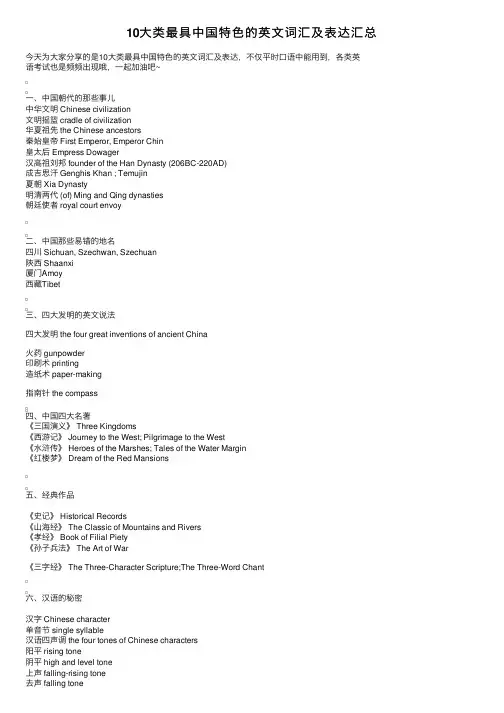
10⼤类最具中国特⾊的英⽂词汇及表达汇总今天为⼤家分享的是10⼤类最具中国特⾊的英⽂词汇及表达,不仅平时⼝语中能⽤到,各类英语考试也是频频出现哦,⼀起加油吧~⼀、中国朝代的那些事⼉中华⽂明 Chinese civilization⽂明摇篮 cradle of civilization华夏祖先 the Chinese ancestors秦始皇帝 First Emperor, Emperor Chin皇太后 Empress Dowager汉⾼祖刘邦 founder of the Han Dynasty (206BC-220AD)成吉思汗 Genghis Khan ; Temujin夏朝 Xia Dynasty明清两代 (of) Ming and Qing dynasties朝廷使者 royal court envoy⼆、中国那些易错的地名四川 Sichuan, Szechwan, Szechuan陝西 Shaanxi厦门Amoy西藏Tibet三、四⼤发明的英⽂说法四⼤发明 the four great inventions of ancient China⽕药 gunpowder印刷术 printing造纸术 paper-making指南针 the compass四、中国四⼤名著《三国演义》 Three Kingdoms《西游记》 Journey to the West; Pilgrimage to the West《⽔浒传》 Heroes of the Marshes; Tales of the Water Margin《红楼梦》 Dream of the Red Mansions五、经典作品《史记》 Historical Records《⼭海经》 The Classic of Mountains and Rivers《孝经》 Book of Filial Piety《孙⼦兵法》 The Art of War《三字经》 The Three-Character Scripture;The Three-Word Chant六、汉语的秘密汉字 Chinese character单⾳节 single syllable汉语四声调 the four tones of Chinese characters阳平 rising tone阴平 high and level tone上声 falling-rising tone去声 falling tone五⾔绝句 a poem of four lines,each containing of five characters对对联 matching an antithetical couplet七、中华⽂化遗产拾珠重要⽂化遗产 major cultural heritage优秀民间艺术 outstanding folk arts⽂物 cultural relics中国画 traditional Chinese painting书法 calligraphy⽔墨画 Chinese brush painting; ink and wash painting⼯笔 traditional Chinese realistic painting中国结 Chinese knot旗袍 Cheongsam中⼭装 Chinese tunic suit唐装 traditional Chinese garments (clothing),Tang suit⼋、中国年&传统节⽇⼗⼆⽣肖 the twele Chinese zodiac signs本命年one s year of birth considered in relation to the 12 Terrestrial Branches 传统节⽇ traditional holidays春节 the Spring Festival元宵节the Lantern Festival (15th day of the first lunar month)清明节the Pure Brightness Festival / the Tomb-sweeping Day (April the 5th)端午节the Dragon Boat Festival (5th of the fifth lunar month)中秋节the Moon Festival / the Mid-Autumn Day (15th of the eight lunar month)重阳节 the Double Ninth Day / the Aged Day九、中国天⼲地⽀等阳历 solar calendar公历 Gregorian calendar阴历 lunar calendar天⼲ heavenly stem地⽀ earthly branch闰年 leap year⼆⼗四节⽓ the twenty-four solar terms⼗、中国瑰宝习武健⾝ practice martial art for fitness⽓功 qigong,deep breathing exercises篆刻 seal cutting upriteous⼯艺, ⼿艺 workmanship/craftsmanship卷轴 scroll蜡染 wax printing泥⼈ clay figurine漆画 lacquer painting唐三彩 Tri-colored glazed pottery of theTang Dynasty景泰蓝 cloisonné(enamel)⽂房四宝 writing materials▼。

我眼中的刘邦作文800英文回答:Liu Bang, also known as Emperor Gaozu of Han, was a prominent figure in Chinese history. He was the founder and first emperor of the Han dynasty, which ruled China for over 400 years. Liu Bang was a charismatic and strategic leader who rose from humble beginnings to become one of the most powerful rulers in Chinese history.One of the things that I admire about Liu Bang is his ability to connect with people from all walks of life. He was known for his down-to-earth personality and his willingness to listen to the concerns of his subjects. For example, when he was still a rebel leader, he gained the support of the common people by promising to lower taxes and improve their living conditions. This ability to empathize with the common folk helped him to gather a large following and eventually overthrow the oppressive Qin dynasty.Another aspect of Liu Bang's character that I find inspiring is his resilience and determination. Despitefacing numerous obstacles and betrayals, he never gave upon his dream of unifying China under his rule. His famous saying, "To govern is to rectify," reflects his unwavering commitment to bringing stability and prosperity to the land. This determination ultimately led to the establishment of the Han dynasty, which brought about a long period of peace and prosperity in China.中文回答:刘邦,汉高祖,是中国历史上的重要人物。
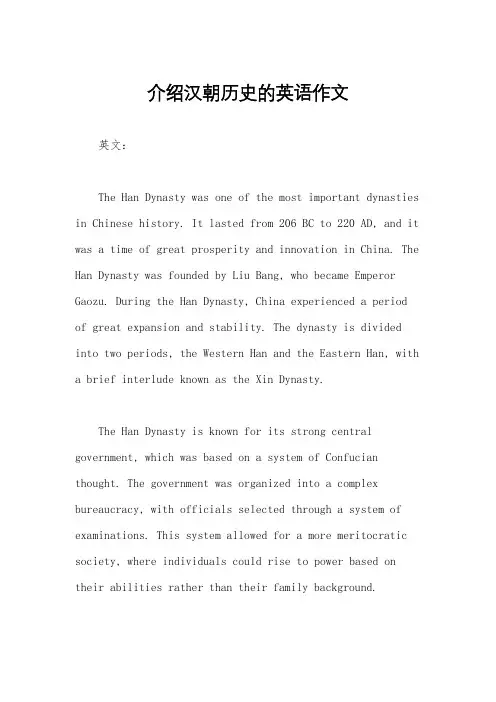
介绍汉朝历史的英语作文英文:The Han Dynasty was one of the most important dynasties in Chinese history. It lasted from 206 BC to 220 AD, and it was a time of great prosperity and innovation in China. The Han Dynasty was founded by Liu Bang, who became Emperor Gaozu. During the Han Dynasty, China experienced a period of great expansion and stability. The dynasty is divided into two periods, the Western Han and the Eastern Han, with a brief interlude known as the Xin Dynasty.The Han Dynasty is known for its strong central government, which was based on a system of Confucian thought. The government was organized into a complex bureaucracy, with officials selected through a system of examinations. This system allowed for a more meritocratic society, where individuals could rise to power based on their abilities rather than their family background.The Han Dynasty also saw significant advancements in technology and culture. The invention of paper and the development of the silk road trade route were both important developments during this time. The Han Dynasty also saw the rise of Confucianism as the dominant philosophy in China, and it had a lasting impact on Chinese culture.In terms of foreign relations, the Han Dynasty was known for its expansionist policies, which led to the establishment of the Silk Road trade route and the opening of new markets for Chinese goods. The dynasty also had extensive contact with the Roman Empire, and there was a significant amount of trade and cultural exchange between the two civilizations.Overall, the Han Dynasty was a time of great prosperity and innovation in China, and it had a lasting impact on Chinese history and culture.中文:汉朝是中国历史上最重要的朝代之一。
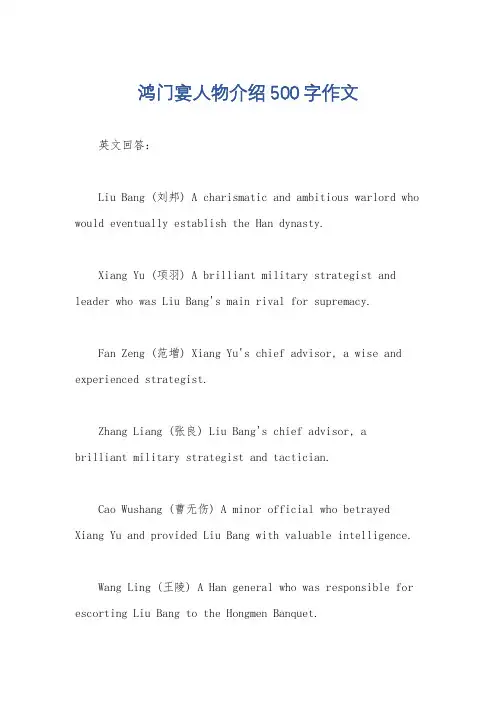
鸿门宴人物介绍500字作文英文回答:Liu Bang (刘邦) A charismatic and ambitious warlord who would eventually establish the Han dynasty.Xiang Yu (项羽) A brilliant military strategist and leader who was Liu Bang's main rival for supremacy.Fan Zeng (范增) Xiang Yu's chief advisor, a wise and experienced strategist.Zhang Liang (张良) Liu Bang's chief advisor, abrilliant military strategist and tactician.Cao Wushang (曹无伤) A minor official who betrayed Xiang Yu and provided Liu Bang with valuable intelligence.Wang Ling (王陵) A Han general who was responsible for escorting Liu Bang to the Hongmen Banquet.Ji Xin (季信) A Han general who volunteered to stay behind as a hostage in Xiang Yu's camp.Zhai Ying (翟婴) A Han general who accompanied Liu Bang to the Hongmen Banquet and played a key role in his escape.Fan Kuai (樊哙) A Han general who was known for his bravery and loyalty. He defended Liu Bang at the Hongmen Banquet, earning Xiang Yu's respect.Liu Fei (刘肥) Liu Bang's son, who attended the Hongmen Banquet as his father's representative.中文回答:刘邦——一位富有魅力、雄心勃勃的军阀,最终建立了汉朝。
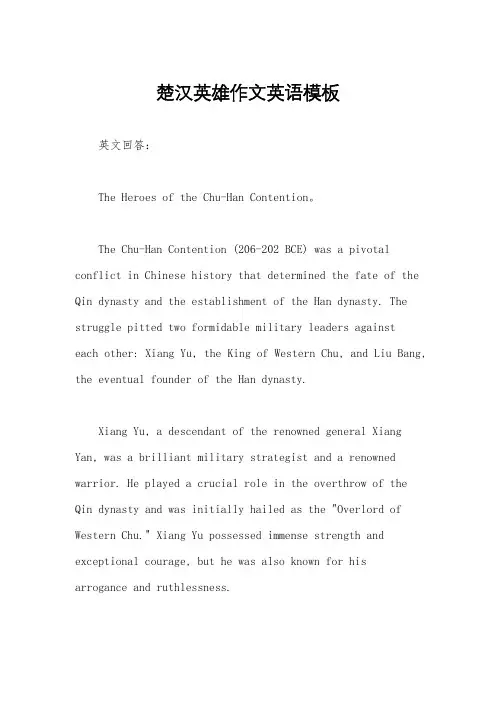
楚汉英雄作文英语模板英文回答:The Heroes of the Chu-Han Contention。
The Chu-Han Contention (206-202 BCE) was a pivotal conflict in Chinese history that determined the fate of the Qin dynasty and the establishment of the Han dynasty. The struggle pitted two formidable military leaders againsteach other: Xiang Yu, the King of Western Chu, and Liu Bang, the eventual founder of the Han dynasty.Xiang Yu, a descendant of the renowned general Xiang Yan, was a brilliant military strategist and a renowned warrior. He played a crucial role in the overthrow of the Qin dynasty and was initially hailed as the "Overlord of Western Chu." Xiang Yu possessed immense strength and exceptional courage, but he was also known for hisarrogance and ruthlessness.Liu Bang, on the other hand, rose from humble beginnings as a minor official in the Qin dynasty. Despite his lack of military experience, Liu Bang proved to be a cunning and charismatic leader. He rallied various factions and warlords to his cause and gradually gained strength. Unlike Xiang Yu, Liu Bang was known for his humility, pragmatism, and ability to unite people.The Chu-Han Contention was characterized by a series of epic battles and political machinations. Xiang Yu initially had the upper hand due to his superior military prowess, but Liu Bang's resilience and adaptability eventually proved decisive. In the end, Liu Bang triumphed over Xiang Yu at the Battle of Gaixia, establishing the Han dynasty and becoming Emperor Gaozu.The legacy of the Chu-Han Contention is still felt today. Xiang Yu is often remembered as a tragic figure, a hero who was ultimately undone by his own hubris. Liu Bang, conversely, is revered as a founder and an exemplary ruler whose reign marked the beginning of a golden age in Chinese history.中文回答:楚汉英雄。
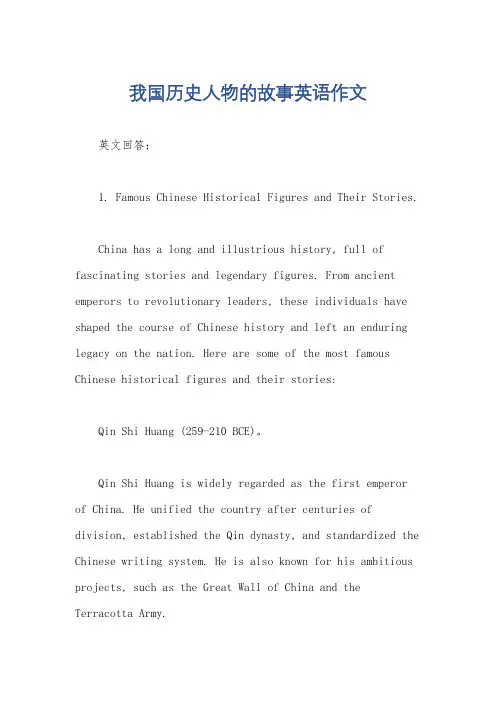
我国历史人物的故事英语作文英文回答:1. Famous Chinese Historical Figures and Their Stories.China has a long and illustrious history, full of fascinating stories and legendary figures. From ancient emperors to revolutionary leaders, these individuals have shaped the course of Chinese history and left an enduring legacy on the nation. Here are some of the most famous Chinese historical figures and their stories:Qin Shi Huang (259-210 BCE)。
Qin Shi Huang is widely regarded as the first emperor of China. He unified the country after centuries of division, established the Qin dynasty, and standardized the Chinese writing system. He is also known for his ambitious projects, such as the Great Wall of China and the Terracotta Army.Liu Bang (256-195 BCE)。
Liu Bang was a peasant who became the founder of the Han dynasty. He defeated Xiang Yu, the last king of the Qin dynasty, in a series of battles and established the Han dynasty, which lasted for over 400 years. His reign was marked by economic prosperity and cultural achievements.Wu Zetian (624-705 CE)。
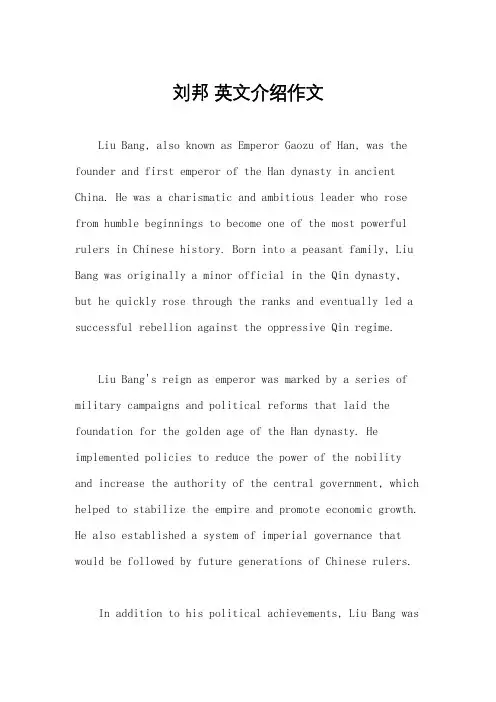
刘邦英文介绍作文Liu Bang, also known as Emperor Gaozu of Han, was the founder and first emperor of the Han dynasty in ancient China. He was a charismatic and ambitious leader who rose from humble beginnings to become one of the most powerful rulers in Chinese history. Born into a peasant family, Liu Bang was originally a minor official in the Qin dynasty, but he quickly rose through the ranks and eventually led a successful rebellion against the oppressive Qin regime.Liu Bang's reign as emperor was marked by a series of military campaigns and political reforms that laid the foundation for the golden age of the Han dynasty. He implemented policies to reduce the power of the nobility and increase the authority of the central government, which helped to stabilize the empire and promote economic growth. He also established a system of imperial governance that would be followed by future generations of Chinese rulers.In addition to his political achievements, Liu Bang wasalso known for his personal charisma and ability to connect with people from all walks of life. He was often described as a wise and benevolent ruler who cared deeply for the welfare of his subjects. His down-to-earth demeanor and willingness to listen to the advice of his advisors endeared him to the common people, who saw him as a leader who truly understood their needs and concerns.Liu Bang's legacy as the founder of the Han dynasty is still celebrated in China today. His contributions to Chinese history and culture are widely recognized, and his reign is often remembered as a time of prosperity and stability. His story continues to inspire people around the world, serving as a reminder of the power of determination and the potential for greatness that lies within us all.。
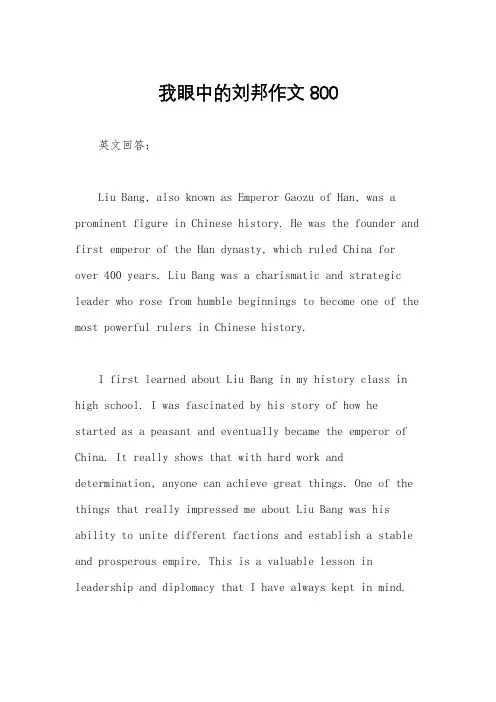
我眼中的刘邦作文800英文回答:Liu Bang, also known as Emperor Gaozu of Han, was a prominent figure in Chinese history. He was the founder and first emperor of the Han dynasty, which ruled China for over 400 years. Liu Bang was a charismatic and strategic leader who rose from humble beginnings to become one of the most powerful rulers in Chinese history.I first learned about Liu Bang in my history class in high school. I was fascinated by his story of how hestarted as a peasant and eventually became the emperor of China. It really shows that with hard work and determination, anyone can achieve great things. One of the things that really impressed me about Liu Bang was his ability to unite different factions and establish a stable and prosperous empire. This is a valuable lesson in leadership and diplomacy that I have always kept in mind.Liu Bang's legacy continues to influence Chinese culture and history to this day. His reign marked the beginning of a golden age in Chinese history, known as the Han dynasty, which saw significant advancements in technology, art, and governance. His story is a reminder that even the most unlikely individuals can rise to great heights and leave a lasting impact on the world.中文回答:刘邦,又称汉高祖,是中国历史上的重要人物。

介绍汉朝历史的英语作文英文:The Han Dynasty was one of the most important dynasties in Chinese history, lasting for over 400 years from 206 BC to 220 AD. It was a time of great cultural, economic, and political development in China.During the Han Dynasty, China experienced a period of expansion and consolidation. The dynasty was founded by Liu Bang, who became Emperor Gaozu. He established the capital in Chang'an (modern-day Xi'an) and set up a centralized government system. This period also saw the introduction of the civil service examination system, which allowed people to become government officials based on their knowledge and merit rather than their social status.One of the most notable achievements of the Han Dynasty was the Silk Road, a network of trade routes that connected China to the Mediterranean. This allowed for the exchangeof goods, ideas, and culture between East and West. The Han Dynasty also made significant advancements in technology, such as the invention of paper and the development of the waterwheel.The Han Dynasty is also known for its cultural achievements, particularly in the fields of literature, art, and philosophy. The period saw the flourishing of Confucianism, which became the dominant ideology of the state. Many great works of Chinese literature, such as "The Book of Han" and "The Records of the Grand Historian," were written during this time.The Han Dynasty came to an end in 220 AD, but itslegacy continued to influence Chinese history for centuries to come.中文:汉朝是中国历史上最重要的朝代之一,持续了400多年,从公元前206年到公元220年。
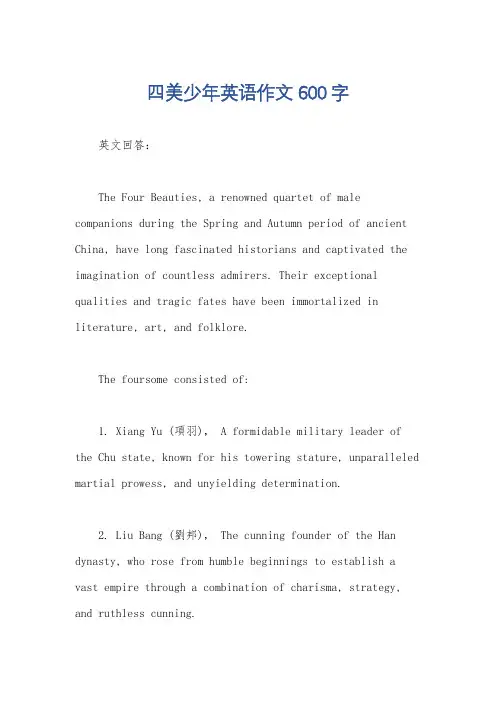
四美少年英语作文600字英文回答:The Four Beauties, a renowned quartet of male companions during the Spring and Autumn period of ancient China, have long fascinated historians and captivated the imagination of countless admirers. Their exceptional qualities and tragic fates have been immortalized in literature, art, and folklore.The foursome consisted of:1. Xiang Yu (項羽), A formidable military leader of the Chu state, known for his towering stature, unparalleled martial prowess, and unyielding determination.2. Liu Bang (劉邦), The cunning founder of the Han dynasty, who rose from humble beginnings to establish a vast empire through a combination of charisma, strategy, and ruthless cunning.3. Han Xin (韓信), A brilliant military strategist who devised ingenious tactics that led to numerous decisive victories, earning him renown as one of the greatest generals in Chinese history.4. Zhongli Mo (鍾離末), A loyal and enigmatic figure who served as Xiang Yu's most trusted advisor, known for his wisdom, unwavering loyalty, and mysterious origins.The Four Beauties' legend is intertwined with the tumultuous events of the time, as they played pivotal roles in the rise and fall of various warring states. Xiang Yu, with his unmatched bravery and fiery determination, was initially victorious in his campaigns but ultimately succumbed to the more calculating Liu Bang. Han Xin's brilliant military maneuvers were instrumental in LiuBang's victory and the establishment of the Han dynasty, but his arrogance and ambition led to his downfall. Zhongli Mo's unwavering loyalty to Xiang Yu and his enigmatic character have made him a subject of fascination and speculation for centuries.Their lives and deaths have been immortalized in numerous works of literature, including the epic novel "Romance of the Three Kingdoms" and the opera "Farewell My Concubine." Their images have been depicted in countless paintings, sculptures, and other works of art. The Four Beauties remain an enduring symbol of bravery, loyalty, ambition, and the complexities of human nature.中文回答:四位美少年。
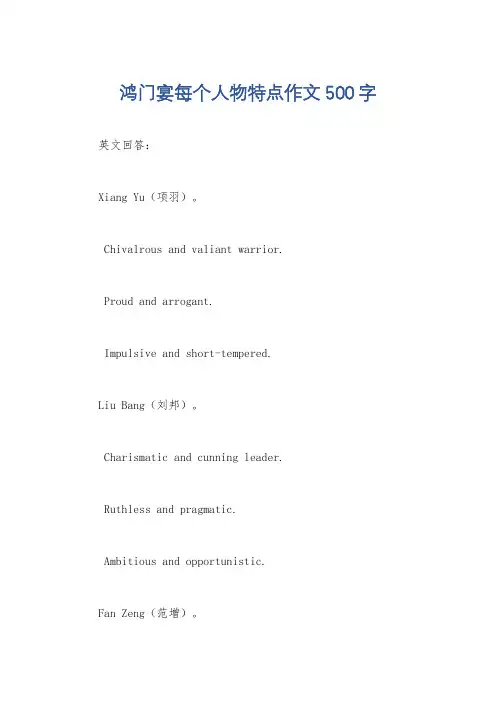
鸿门宴每个人物特点作文500字英文回答:Xiang Yu(项羽)。
Chivalrous and valiant warrior.Proud and arrogant.Impulsive and short-tempered.Liu Bang(刘邦)。
Charismatic and cunning leader.Ruthless and pragmatic.Ambitious and opportunistic.Fan Zeng(范增)。
Wise and experienced strategist.Loyal and devoted to Xiang Yu.Proud and uncompromising.Zhang Liang(张良)。
Brilliant military strategist.Loyal and resourceful advisor to Liu Bang. Calm and collected under pressure.Li Shiqi(李斯)。
Eloquent and persuasive orator.Ambitious and opportunistic.Cunning and manipulative.Cao Wushang(曹无伤)。
Loyal and outspoken retainer of Xiang Yu. Outspoken and fearless.Impulsive and reckless.Zhongli Mo(钟离昧)。
Talented and skilled swordsman.Loyal and devoted to Liu Bang.Quick-witted and resourceful.Peng Yue(彭越)。
Guerrilla warfare expert.Cunning and resourceful.Ambitious and opportunistic.Ying Bu(英布)。
能言善辩的刘邦800字作文(中英文实用版)English:Liu Bang, a man of great oratory skills, was a remarkable figure in Chinese history.He was born into a humble family, yet he rose to become the founding emperor of the Han Dynasty, one of the longest and most influential periods in Chinese history.His journey from a commoner to a emperor is a testament to his eloquence and persuasive abilities.中文:刘邦,一位能言善辩的人物,是中国历史上杰出的英雄。
他虽然出身布衣,却一路逆袭成为汉朝的开国皇帝,这是中国历史上最长且最具影响力的朝代之一。
他从一个普通人到皇帝的蜕变,充分证明了他的口才和说服力。
English:Liu Bang was known for his ability to connect with people from all walks of life.He was a master of using simple language to convey complex ideas, making him easily understood by the common people.His oratory skills were so impressive that they earned him the title of "The Emperor of persuasion".中文:刘邦以能够与各行各业的人打成一片而著称。
刘邦LiúBāng (256-195 BC)Founder of the Powerful Han DynastyLiu Bang was a peasant rebel leader who became a hero as founder and first emperor of theover 200-year-long, powerful Western Han Dynasty (206 BC-25 AD). It was followed by another200 years of the Eastern Han Dynasty (25-220 AD). British historian Arnold Toynbee (1889-1975) once said: "The two most far-sighted and influentialpolitical figures in the history of mankind are Caesar, who founded the Roman Empire, and LiuBang, who founded the Han Empire."Liu was born in a peasants' family in today's Feng County in east China's Jiangsu Province.According to legend, before Liu was born, his mother took shelter under a bridge during arainstorm. A dragon suddenly appeared in the dark sky. She found herself pregnant and gavebirth to Liu Bang.The boy Liu did not like reading and was frequently chided by his teacher and parents forskipping school. When he grew up, Liu first worked as a patrol officer in a small hamlet in hishome county.After some time, he became close to some county officials andbecame well regarded.One day, while Liu was escorting convicts to a place called Xianyang, he encountered a grand procession of Qin Shi Huang, the first emperor of the Qin Dynasty (221-206 BC). He was soimpressed by its majesty and extravagance that he blurted out: "As a man, one should live a lifelike that."Not long afterward, while Liu was escorting another group of convicts on a journey to Mt Li,some convicts managed to escape at night.According to harsh laws at the time, Liu would be held responsible and executed. So, he decidedto set the remaining convicts free and he himself went into hiding. But some of the convictsvolunteered to follow him.During the late years of the Qin Dynasty and particularly after the death of the first emperor in210 BC, peasant rebellions and uprisings had spread across the country like wildfire. Then, themagistrate of Liu's home county decided to join the insurrection against the Qin rule.And following his aides' advice, he asked Liu to come back and join his forces. However, justwhen Liu was about to arrive at the county seat, the magistrate regretted and ordered allcitygates closed to prevent Liu from entering.Liu used arrows to shoot leaflets into the city, instigating locals to kill the magistrate and openthe city gates for him. As many residents had long resented the county chief's greedy andunpopular administration, so they followed Liu's call and killed the magistrate.After Liu entered the city, locals called him the Duke of Pei. Pei was the ancient name of his home county. In following days, Liu organized a rebel army and began to fight Qin forces. Afternumerous battles, Liu's forces made steady advance toward Xianyang, the capital of the QinDynasty. In December 207 BC, seeing that the war was as good as lost, the Qin rulersurrenderedto Liu, bringing an end to the Qin rule.After entering Xianyang, Liu immediately abolished the harsh Qin laws and adopted newregulations to protect common people's property and lives, winning great popular support. However, the country was not united then. Another rebel force led by Xiang Yu, known as theHegemon-King of Western Chu, was challenging Liu for dominance. The battles between the Hanforces led by Liu and the Chu forces led by Xiang lasted for four more years.It was not until Xiang's forces were routed in the famous battle of Gaixia and then Xiangcommitted suicide that Liu eventually united the country and proclaimed himself the firstemperor of the Western Han Dynasty.The powerful Han Dynasty had a great influence on Chinese social, economic and politicalsystems and culture.Even today, people use "Han" to name the majority ethnic group in the country and the Chineselanguage.。
走进秦汉英雄刘邦作文In history, Liu Bang, also known as Emperor Gaozu of Han, was a prominent figure in Chinese history. 历史上,刘邦,又称汉高祖,是中国历史上的杰出人物。
He was the founder and first emperor of the Han dynasty, which ruled China for over 400 years. 他是汉朝的创立者和第一位皇帝,汉朝统治中国400多年。
Liu Bang rose from humble beginnings and eventually became a powerful leader who played a crucial role in the unification of China. 刘邦从卑微的出身出发,最终成为一个强大的领袖,在中国的统一过程中发挥了至关重要的作用。
His leadership and military prowess helped him overthrow the Qin dynasty and establish the Han dynasty. 他的领导才能和军事才华帮助他推翻秦朝,建立了汉朝。
Liu Bang's rise to power was not without obstacles, and his ability to overcome challenges and establish a lasting dynasty is a testamentto his resilience and determination. 刘邦的权力之路并非一帆风顺,他能够克服挑战,建立一个持久的王朝,这是对他坚韧和决心的证明。
Liu Bang's reign was marked by policies that aimed to benefit the people, reform the government, and promote economic development. 刘邦的统治以惠民政策、政府改革和促进经济发展为标志。
英雄刘邦英语作文Everyone has a favorite historical figure, and I’m no exception: My favorite historical figure is Emperor Gaozu of Han Emperor Gaozu of Han. Emperor Gaozu of Han, he’s a legend. Emperor Gaozu of Han, who, as a police officer, had escaped a few prisoners while he was transporting them, knew he was to blame, so he let them all go. In this he also cut a white snake, listen to his men say: “That white snake is the son of the white emperor was killed by the Red Emperor Son.”Emperor Gaozu of Han, he’s a legend. In the battle between Chu and Han, Emperor Gaozu of Han was not as good as Xiang Yu, but he defeated the mighty Xiang Yu. And why is that? Because Emperor Gaozu of Han was able to use Xiao He, Han Xin, Zhang Liang... Emperor Gaozu of Han’s use of his men’s talents was the key to his success. Emperor Gaozu of Han is a legend. Not only was Emperor Gaozu of Han militarily formidable, but he was also a well written man. “The wind is blowing, the clouds are flying, the man is full of ambition...”This is his song of the gale. Although his poem is not widely spread, but this poem is written or generous passionate, heroic. The poem expresses, so to speak, the ambition of his heart. And, of course, added a little to his pomp and circumstance. In social status, Emperor Gaozu of Han was the emperor of the Han Dynasty. In character, Emperor Gaozu of Han is brave and literate. So Emperor Gaozu of Han Emperor Gaozu of Han is my favorite historical figure.。
史记中人物介绍作文英语标题,Introduction of Historical Figures in "Records of the Grand Historian" An English Essay。
The "Records of the Grand Historian" is a monumental work in Chinese historiography, compiled by the Han dynasty historian Sima Qian. Within its pages, numerous historical figures are vividly portrayed, offering insights into their lives, achievements, and legacies. In this essay, we will explore some of the notable figures introduced in "Records of the Grand Historian" and delve into their significancein shaping Chinese history and culture.1. Emperor Qin Shi Huang (秦始皇)。
Emperor Qin Shi Huang, the first emperor of China, is one of the most prominent figures chronicled in "Records of the Grand Historian." Born as Ying Zheng, he ascended to the throne of the Qin state at the age of 13 and later unified China through conquest, establishing the Qindynasty. Renowned for his ruthless tactics andauthoritarian rule, Qin Shi Huang implemented several reforms, including standardizing weights and measures, currency, and writing systems. He is also famous for initiating the construction of the Great Wall of China, aimed at protecting the northern border from invasions.However, Emperor Qin Shi Huang's reign was marked by controversy and tyranny. He ordered the burning of booksand the burial of scholars in an attempt to suppress dissenting voices and consolidate his power. Despite his achievements in unification and infrastructure, his authoritarian methods and harsh policies have cast a shadow over his legacy, earning him both admiration and condemnation in Chinese history.2. Confucius (孔子)。